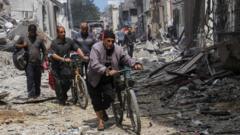Recent torrential rains in Kinshasa, Democratic Republic of Congo, have led to significant casualties and destruction, highlighting the alarming consequences of climate change in the region.
Dozens Perish in Devastating Floods Across Kinshasa

Dozens Perish in Devastating Floods Across Kinshasa
Catastrophic flooding strikes the capital of the Democratic Republic of Congo as rains wreak havoc on the city’s infrastructure.
In the wake of severe flooding in Kinshasa, the capital city of the Democratic Republic of Congo, at least 33 lives have been lost and hundreds of homes destroyed, as reported on April 8, 2025. The Ndjili River overflowed, inundating densely populated areas and major roadways, including Lumumba Boulevard, which connects to the airport. With rapid urbanization and inadequate drainage systems compounding the peril, thousands of residents have been displaced from their homes.
The floods have brought devastating back-to-back crises to a nation grappling with a violent conflict in its eastern regions. President Felix Tshisekedi visited the affected neighborhoods, acknowledging the devastation and promising food relief for the displaced families. He attributed the high casualties to the prevalence of illegal settlements built in vulnerable areas of the city.
Denise Sukali, a witness to the chaos, shared, “We just managed to save our lives. I’m safe with all my family, but my house is under water.” This sentiment reflects the grim realities many families face as they seek refuge from the relentless flooding.
Previously, in 2024, the country experienced its deadliest floods in six decades, resulting in over 300 fatalities and the displacement of approximately 280,000 households. The rise in casualty numbers over recent years has linked directly to the impacts of climate change, with many regions in Africa facing an uptick in severe weather events. The recurring floods and droughts demonstrate an urgent need for enhanced infrastructure and disaster preparedness efforts across the continent.
As humanitarian efforts are underway, the challenge continues as the U.S. recently cut back on foreign aid, impacting crucial support during a time when over 7 million Congolese depend on it for food, water, and shelter. With the government and humanitarian agencies in action, the urgent need for effective solutions to mitigate future disasters is becoming increasingly clear—especially in a country already facing some of the most severe humanitarian crises globally.
This severe flooding crisis adds an additional layer of urgency to an already troubled region where rapid population growth and instability are prevalent.




















